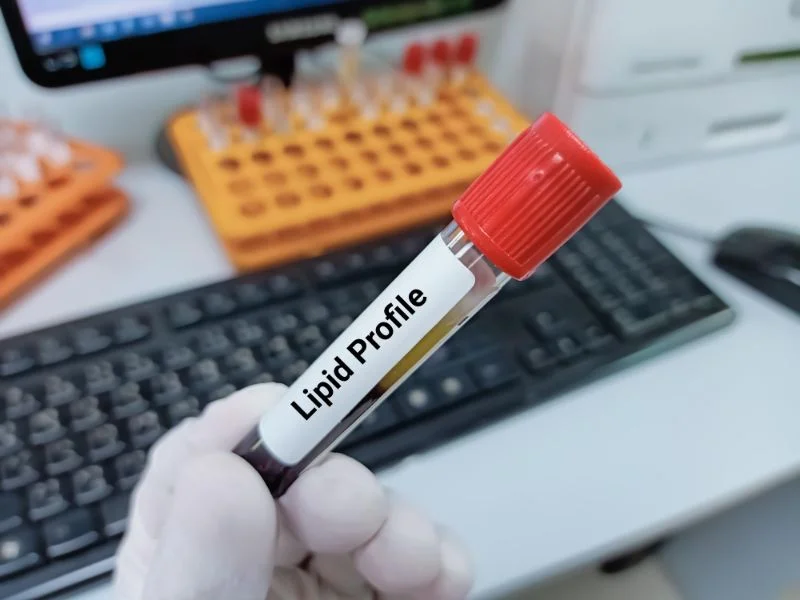Lipid buildup in blood vessels and arteries can have severe health-related consequences, including cardiovascular disorders. A lipid panel test comes in handy in this domain as it identifies the lipid profile of an individual, which can aid in diagnosing impending or present ailments. Let us delve into the normal lipid panel ranges, the test's cost, and why it is significant.
What is a Lipid Panel Blood Test?
A lipid panel blood test is the measure of lipid or fat molecules in an individual's blood. This test also includes measurements of the different kinds of cholesterol and triglycerides. A lipid panel is also commonly known as a coronary risk panel, fasting lipid panel or nonfasting lipid panel, lipid test, cholesterol panel, or lipid profile. Accumulation of lipids contributes to several diseases like myocardial infarction and stroke, and that is why a lipid panel test can prove life-saving in some cases.
Which Tests are included in a Lipid Panel Blood Test?
A standard lipid profile test typically calculates five different types of lipid in a blood sample, but others may constitute other measurements. The five lipid types include:
-
The total cholesterol
-
Very low-density lipoprotein (VLDL) cholesterol
-
Low-density lipoprotein (LDL) cholesterol
-
High-density lipoprotein (HDL) cholesterol
-
Triglycerides
The total cholesterol in the bloodstream accounts for the overall cholesterol level, which is a combination of VLDL-C, LDL-C, and HDL-C.
The very low-density lipoprotein (VLDL) cholesterol is present in minute amounts in the blood, especially in a blood sample taken when fasting because it comes from ingested food. If VLDL amounts are quite high in a fasting sample, an individual may be suffering from abnormal lipid metabolism.
Low-density lipoprotein (LDL) cholesterol is generally known as "bad cholesterol" because it is prone to accumulation in the blood vessels and arteries, elevating the risk of cardiovascular disorders and other related diseases. In contrast, High-density lipoprotein (HDL) cholesterol is typically known as the "good cholesterol" as it aids in diminishing the cumulation of LDL in blood vessels.
Triglycerides are the kind of fat that comes from the food we eat—high amounts of this fat in blood hint at pancreatic inflammation and cardiovascular disorders.
What is the Normal range in the Lipid Profile Blood Test?
Cholesterol level in blood is usually measured in milligrams per deciliter (mg/dL). The normal lipid profile range for different kinds of cholesterol are as follows:
-
The total cholesterol has a normal range lower than 200mg/dL.
-
LDL cholesterol is normally between 70 to 130mg/dL.
-
HDL cholesterol ranges from 40 to 60mg/dL.
-
Triglycerides are normal in range when in between 10 to 150 mg/dL.
What do Varying Results of a Lipid Panel Blood Test Ascertain?
Higher or lower than normal ranges of VLDL, LDL, HDL, cholesterol, and triglycerides do not necessarily indicate a dire medical condition. It is pivotal to consult with a healthcare provider to gain better insight into your situation, as many factors affect healthy cholesterol levels. These factors include:
Special risk calculators are available to evaluate whether an individual requires treatment, further diagnostic testing, or nothing at all.
Do you need to Fast for a Lipid Panel Test?
Lipid panel testing usually requires fasting for about 10 to 12 hours before it is conducted. However, it is essential to consult with a healthcare provider to ensure that your medical condition can sustain the fasting period. Drinking water is not prohibited in fasting for lipid panel testing.
How much does a Lipid Panel Blood Test Cost?
Although the prices may vary from one diagnostic or pathological lab to another, a lipid panel blood test is a relatively affordable procedure and is not too expensive. Sample collection can also be carried out at home, but the price range varies in that case.
Should you get a Lipid Panel Blood Test?
Lipid panel blood tests are prescribed for various screening and monitoring reasons that may even translate to diagnostic purposes. Lipid profile tests can also be used to detect other ailments such as chronic kidney diseases, hypothyroidism, and pancreatitis.
Individuals with two or more risk factors for cardiovascular diseases are most commonly prescribed lipid panel tests. Regular testing can detect high cholesterol levels for immediate redress if you check the boxes for cardiovascular risk factors. These risk factors include hypertension (high blood pressure), diabetes or prediabetes, a history of high cholesterol, smoking, age above 45 if you are a male and over 50 if female, and obesity.
In some cases, having a first-degree relative with the early development of heart diseases, lack of physical activities in lifestyle, and an unbalanced diet may even be considered risk factors. No need to worry if you check the boxes mentioned above; you can get yourself tested right now at SmartClinix and consult with the most learned experts at any time that suits your schedule by booking a physical appointment or via telehealth. Check out their website right now for more insight!
References
“The New 2018 Cholesterol Guidelines | Circulation (ahajournals.org)”- https://www.ahajournals.org/doi/10.1161/CIRCULATIONAHA.118.038629
“Atherosclerotic Cardiovascular Disease Risk and Evidence-based Management of Cholesterol - PMC (nih.gov)” https://www.ncbi.nlm.nih.gov/pmc/articles/PMC4049051/
"Lipid panel" by the Mayo Clinic: https://www.mayoclinic.org/tests-procedures/lipid-panel/about/pac-20384601
Our clinical experts continually monitor the health and medical content posted on CURA4U, and we update our blogs and articles when new information becomes available. Last reviewed by Dr.Saad Zia on April 26th, 2023.












